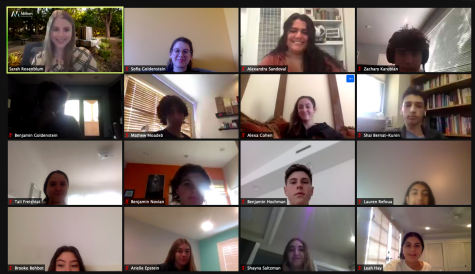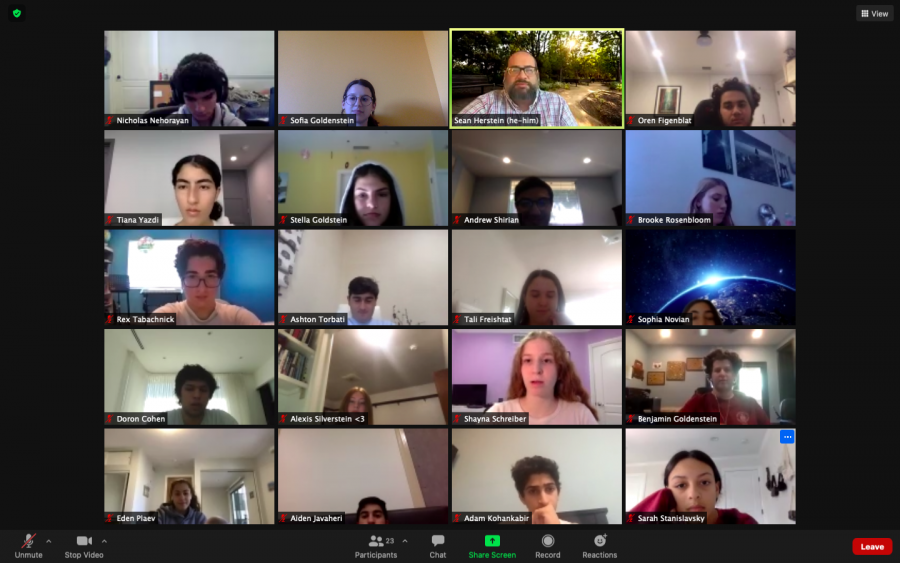Zooming In: How Teachers are Dealing with Virtual School
While attempting to navigate the virtual classroom, all of a sudden an unfamiliar face joins the classroom and starts screaming explicit language sending the class into a chaotic mess. That is just one example of the new challenges the Milken Faculty has to deal with in a virtual environment.
Online learning has definitely been a struggle for students; the abrupt switch from in-person learning to virtual learning and all of the changes that came with it has been difficult for students to get used to, even months later. The same goes for teaching: teachers had to adjust their curriculum, change the way they assessed, and be flexible with the varying schedules and shorter classes. While this was definitely not what they signed up for when they decided to start teaching, teachers have adjusted to this new way of life. Generally, teachers are making online learning work, even if it’s not what they had in mind for this school year.
Teaching in person can be a hard task, with the ups and downs of teaching teenage students. Now, teachers have to deal with that while being in an easily ignorable tiny box on a computer. While it is easy to ensure there is no cheating during assessments while at school, when everyone is at home, it is difficult to ensure academic honesty. Mathematics Chair Monica Daranyi says, “There is no foolproof way to battle cheating during assessments.” While students may feel happy that it is easier to cheat than actually learn the material, they are only really harming themselves and their ability to grasp future concepts.
But there are some preventative measures teachers can take to try and keep cheating to a minimum. Ms. Guth, History Chair of the Upper School, stated, “I am no longer putting multiple-choice sections in my tests.” She felt that the only way to hinder the chances of cheating would be to eliminate questions on exams that are easily searched-up, replacing them instead with essays and more work that won’t be easy to find on the internet. Another big difference between online school and in-person school is being able to read students’ body language and feelings. When teaching in person, it can be easy to read a student’s body language and make sure they are focused and paying attention, or if a joke was funny to them. Now, it is almost impossible to see how kids are feeling purely based on physical signs, and because everyone is constantly on mute, it is even harder. 
While sometimes students can get lost focusing on the bad parts of having to do online school, virtual learning has opened up a lot of doors for the future of education and technology. “Online teaching has forced me to become more tech-savvy and I have learned a lot about electronics.” says Ms. Darayni, “and it has been easier to get in touch with students and schedule meetings when necessary.” Not only that, but information has been much more easily accessible, with all lesson plans on documents and teachers just an email away. Another big difference has been that the first day of school was much less stressful than years before. Instead of being intimidated by all of your new classmates and teachers looking at you in class, it is much less stressful. Ms. Guth shared, “It has been a nice change that students don’t seem so intimidated now because I am just a tiny box on the screen.”
English Department Chair Mr. Moran notes another nice aspect: “ I have had the opportunity to reconnect with old students and alums.” Because everybody is home all the time, it is easier to get in touch with old students and reconnect with people we did not have time for in our busy schedules. It has also allowed everyone to wake up much later, which has been a welcome change across the board. Nobody misses waking up at the crack of dawn.
Like most things in life, virtual learning has its positives and negatives. It is easy for students to focus on only how virtual school has affected them and it is important to understand and see the effort the teachers are putting into virtual school in order to make it as good as it can get. Be sure to thank your teachers after classes and try and reach out to them to make virtual learning just a little bit easier.

Sofia Goldenstein is a senior at Milken and this is her third year taking journalism. She enjoys writing about school events and TV shows. She especially...




Karen Fertman • Nov 5, 2020 at 2:58 pm
Great Article! So much wisdom!